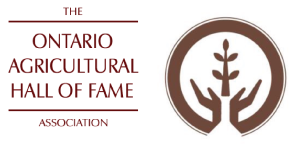Inductees

Herbert G. Norry
Year of birth: 1924
Inducted in 2021
Origin: Kent County
Nominated by: Art and Jean Bennett and Mary Ellen Norry Car
Specialty: Government
Herb Norry “lived” agriculture in all he did and was widely known and respected as an agricultural extension specialist, as a catalyst for agricultural innovation, as a coach for members of 4-H and Junior Farmers, and as an expert in farm transfers and tax management. He had a 32-year career with the Ministry of Agriculture and Food from 1949-84 and was recognized within government and the agricultural community as an expert resource for farm transfers and enterprise analysis. In 1984, he received the T.R. Hilliard Distinguished Agricultural Extension Award.
He helped to establish 4-H clubs and was a charter member of the Junior Farmers’ Association of Ontario. He knew these organizations helped to teach agricultural production skills as well as leadership and communication skills to rural youth. Herb’s successful approaches to delivery of these programs helped to lay the groundwork for 4-H Ontario when 4-H was transferred from government to a not-for-profit organization. It also helped to provide a basis for the Rural Ontario Institute for rural leadership development and issues analytics, and for the eventual establishment of the Environmental Farm Plan.
Herb also recognized that women were an important force in agriculture yet often did not attend the training sessions he had designed for farmers each winter. He worked with Dianne Harkin, founder of Women for the Survival of Agriculture, to develop a course for farm women on accounting, income tax filing, insurance and record keeping. This initiative morphed into an expanded program held at Kemptville College and then in turn led to the founding of the Canadian Women’s Educational Council.
Herb’s influence in agriculture took many directions. He was a key organizer and presenter at the annual OMAF Regional Farm Tax and Business seminars for lawyers, accountants, bankers and agricultural consultants. He established a Technology Assessment Panel for a federal-provincial initiative called the Soil and Water Environmental Enhancement Program (SWEEP) designed to reduce the amount of phosphorus going from farmland into the Great Lakes basin. One of the lasting developments of SWEEP was the creation of the Innovative Farmers Association of Ontario to promote environmentally and economically sustainable cropping practices.

